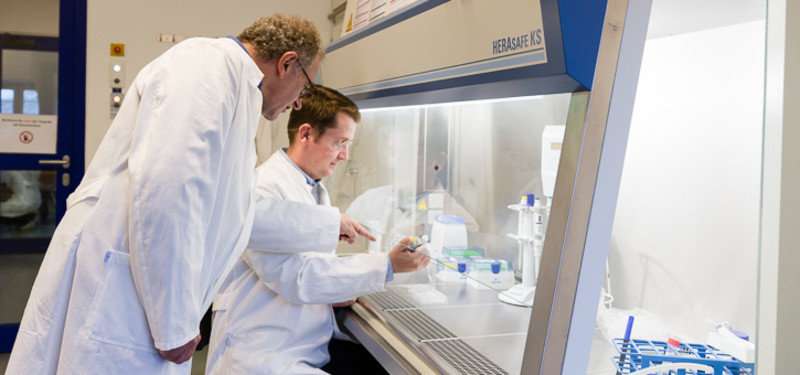Leuphana scientists develop environmentally friendlier antibiotics

The team led by Professor Dr. Klaus Kümmerer has now succeeded in developing antibiotics of this class of substances that become innocuous in the environment by natural degradation.
Ciprofloxacin is a widely used broad-spectrum antibiotic. In Germany alone, 33 tons of them are prescribed in human and veterinary medicine. Both improper disposal and incomplete metabolization after administration means it is released after use virtually unmodified into the environment – a fate it shares with many other active pharmaceutical ingredients. Even small concentrations of this antibiotic stimulate the growth of resistant bacteria. Now, researchers at Leuphana University of Lüneburg, led by Professor Klaus Kümmerer, an expert in sustainable chemistry and resources, have developed and are seeking to patent antibiotics, which become inactive by natural degradation once they have been excreted. "This marks the first time that a new active ingredient has been specifically developed to be both effective and environmentally friendly. We now have a new active ingredient that works in the test tube, but is not yet a perfected drug," Kümmerer said. This starting point now provides the opportunity for drug manufacturers to create a 'greener' pharmacy.
Since ciprofloxacin, like many other antibiotics and active pharmaceutical ingredients, does not biodegrade in the environment, it accumulates as an active ingredient in sewage sludge, water or sediments. Its use in animal husbandry allows it to access the soil in liquid manure, where food crops absorb it. Thus, it likely contributes to spreading antimicrobial resistance. "Benign by design" is the response of the team from Leuphana's Institute for Sustainable Chemistry and Environmental Chemistry to this massive contamination threatening the environment. The Benign by Design approach means that new active ingredients are planned from the start so as to make them more environmentally friendly.
The Leuphana researchers have been working for five years on the development of an antibiotic that degrades after its medical use. In other words, as it is no longer active, it follows that it does not contribute to the development of resistances in the environment. Since 2014, the German Federal Environmental Foundation (Deutsche Bundesstiftung Umwelt) has been subsidising the project with around €460,000. Ciprofloxacin was selected as the starting molecule because of its frequent use and its long-term exposure to the environment. The challenge the chemists face: The active ingredient is meant to disintegrate after its medical application, yet it must remain sufficiently stable in the blood stream for example. This was achieved by specifically modifying ciprofloxacin's chemical structure to meet both requirements.
The demand for biodegradable active pharmaceutical ingredients is considerable, because the active substances currently in use are causing serious environmental pollution. Dr. Christoph Leder of Kümmerer's Team explains that "If one wanted to dilute the amounts used in Germany alone in one year down to a safe concentration, one would need the volume of seven times Lake Constance."
As early as 2015, the scientists from Lüneburg succeeded in improving the biodegradability of propranolol, a widely used active ingredient against high blood pressure from the beta-blockers group. Professor Kümmerer hopes that, thanks to the research's success, the biodegradability of antibiotics and other active pharmaceutical ingredients in the environment will now become a new approval criterion for drugs, as feasibility has been successfully demonstrated.
Provided by Leuphana Universität Lüneburg



















